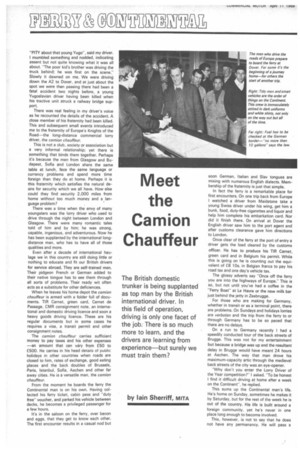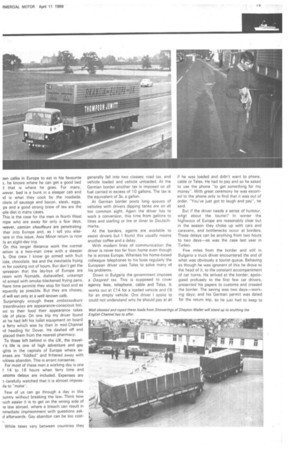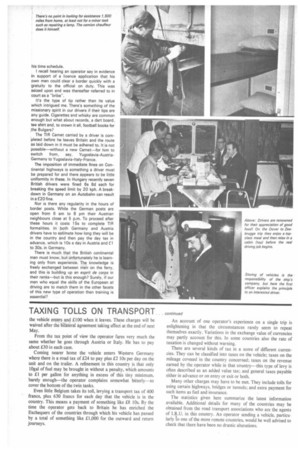Meet the Camion Chauffeur
Page 76

Page 77

Page 78

If you've noticed an error in this article please click here to report it so we can fix it.
The British domestic trunker is being supplanted as top man by the British international driver. In this field of operation, driving is only one facet of the job. There is so much more to learn, and the drivers are learning from experience—but surely we must train them?
"PITY about that young Yugo", said my driver. I mumbled something and nodded, indicating assent but not quite knowing what it was all about. "The poor kid's brother was driving the truck behind; he was first on the scene."
Slowly it dawned on me. We were driving down the A2 to Dover, and at just about the spot we were then passing there had been a fatal accident two nights before, a young Yugoslavian driver having been killed when his tractive unit struck a railway bridge support.
There was real feeling in my driver's voice as he recounted the details of the accident. A
close member of his fraternity had been killed. This and subsequent small events introduced me to the fraternity of Europe's Knights of the Road—the long-distance commercial lorry driver, the cam/on chauffeur,
This is not a club, society or association but a very informal relationship; yet there is something that binds them together. Perhaps it's because the men from Glasgow and Budapest, Sofia and London share the same table at lunch, face the same language or currency problems and spend more time foreign than they do at home. Perhaps it is this fraternity which satisfies the natural desire for security which we all have. Flow else could they find security 2,000 miles from home without too much money and a language problem?
There was a time when the envy of many youngsters was the lorry driver who used to drive through the night between London and Glasgow. There were many romantic tales told of him and by him; he was strong, capable, ingenious, and adventurous. Now he has been supplanted by the international longdistance man, who has to have all of those qualities and more.
Even after a decade of international haulage we in this country are still doing little or nothing to educate and fit our British drivers for service abroad. They are self-trained men. Their pidgeon French or German added to their native tongue has to see them through all sorts of problems. Their ready wit often acts as a substitute for other deficiences.
When he leaves his home depot the cam/on chauffeur is armed with a folder full of docu
ments. TIR Carnet, green card, Carnet de Passage, CMR consignment note, an international and domestic driving licence and soon a heavy goods driving licence. These are his regular documents but in some cases he requires a visa, a transit permit and other consignment notes.
The cam/on chauffeur carries sufficient money to pay taxes and his other expenses
—an amount that can vary from £50 to £500. He carries in his head details of public holidays in other countries when roads are closed to him, rates of exchange, good eating places and the back doubles of Brussels,
Paris, Istanbul, Sofia, Aachen and other far away cities. He is a versatile man, the cam/on chauffeur.
From the moment he boards the ferry the Continental man is on his own. Having collected his ferry ticket, cabin pass and "duty free" voucher, and parked his vehicle between decks, he becomes a privileged passenger for a few hours.
It's in the saloon on the ferry, over bacon and eggs, that they get to know each other. The first encounter results in a casual nod but soon German, Italian and Slav tongues are mixing with numerous English dialects. Membership of the fraternity is just that simple.
In fact the ferry is a remarkable place for first encounters. On one trip back from Europe I watched a driver from Maidstone take a young Swiss driver under his wing, get him a bunk, food, duty-free cigarettes and liquor and help him complete his embarkation card. Nor did it finish there. On arrival at Dover the English driver saw him to the port agent and after customs clearance gave him directions to London.
Once clear of the ferry at the port of entry a driver gets the load cleared by the customs officer. He has to produce his TIR Carnet, green card and in Belgium his permit. While this is going on he is counting out the equivalent of £8 10s. in Belgian francs to pay his road tax and one day's vehicle tax.
The glossy adverts say "Once off the ferry you are into the highways of Europe." This is so, but not until you've had a coffee in the "Ferry Boat" at Le Havre or the new milk bar just behind the jetty in Zeebrugge.
For those who are making for Germany, whether in transit or as a terminal point, there are problems. On Sundays and holidays lorries are verboten and the trip from the ferry to or through Germany has to be so paced that there are no delays.
On a run to Germany recently I had a speedily conducted tour of the back streets of Brugge. This was not for my entertainment but because a bridge was up and the resultant delay in Brugge would have meant 24 hours at Aachen. The way that man drove his maximum-capacity artic through the medieval back streets of the city was an eye-opener.
'Why don't you enter the Lorry Driver of the Year competition?" I asked. "To be honest I find it difficult driving at home after a week on the Continent", he replied.
This sums up the Continental man's life. He's home on Sunday, sometimes he makes it by Saturday, but for the rest of the week he is out of the country. His life is built around a foreign community, yet he's never in one place long enough to become involved.
This, however, is not to say that he does not have any permanancy. He will pass a
zen cafés in Europe to eat in his favourite a, he knows where he can get a good bed I that is where he goes. For many, never. bed is a bunk in a sleeper cab and id is what they cook by the roadside. ckets of sausage and bacon, steak, eggs, ps and a good strong brew of tea are the 'pie diet in many cases.
This is the case for the men in North West rope who are away for only a few days.
■ wever, cam/on chauffeurs are penetrating .ther into Europe and, as I tell you elsetere in this issue, Asia Minor return is now ly an eight-day trip.
On this longer distance work the normal isition is a two-man crew with a sleeper b. One crew I know go armed with fruit ices, chocolate, tea and the inevitable frying in for cooking out of hours. But don't get the ipression that the lay-bys of Europe are rewn with Nomads, dishevelled, unkempt id armed with smoke-blackened frying pans. 'here time permits they stop for food and as aquently as possible. But they are choosy, Id will eat only at a well-known cafe.
Surprisingly enough these ambassadeurs traordinaires are appearance-conscious too. axt to their food their appearance takes ide of place. On one trip my driver found at he had left his toilet equipment on board e ferry which was by then in mid-Channel id heading for Dover. He dashed off and placed them from the nearest pharmacy.
To those left behind in the UK, the travelr's life is one of high adventure and gay ghts in the capitals of Europe where exarises are "fiddled" and frittered away with ickless abandon. This is arrant nonsense.
For most of these men a working day is one f 14 to 16 hours when ferry time and JStOMS delays are included. Expenses are 3 Carefully watched that it is almost impossile to "make".
Few of us can go through a day in this Duntry without breaking the law. Think how iuch easier it is to get on the wrong side of le law abroad, where a breach can result in nmediate imprisonment with questions askd afterwards. Gay abandon can be too cost While taxes vary between countries they generally fall into two classes: road tax, and vehicle loaded and vehicle unloaded. At the German border another tax is imposed on all fuel carried in excess of 10 gallons. The tax is the equivalent of 3s. a gallon.
At German border posts long queues of vehicles with drivers dipping tanks are an all too common sight. Again the driver has to work a conversion, this time from gallons to litres and sterling or lire or dinar to Deutschmarks.
At the borders, agents are available to assist drivers but I found this usually means another coffee and a delay.
With modern lines of communication the driver is never too far from home even though he is across Europe. Whereas his home-based colleague telephones to his boss regularly the European driver uses Telex to solve many of his problems.
Down in Bulgaria the government imposes a Despred tax. This is supposed to cover agency fees, telephone, cable and Telex. It works out at £14 for a loaded vehicle and C6 for an empty vehicle, One driver I spoke to could not understand why he should pay at all
if he was loaded and didn't want to phone, cable or Telex. He had to pay and so he asked to use the phone "to get something for my money". With great ceremony he was escorted to the phone only to find that it was out of order. "You've just got to laugh and pay-, he said.
But if the driver needs a sense of humour, whpt about the tourist? In winter the highways of Europe are reasonably clear but in the season they choke up with cars and caravans, and bottlenecks occur at borders. These delays can be anything from two hours to two days—as was the case last year in Turkey.
Five miles from the border and still in Bulgaria a truck driver encountered the end of what was obviously a tourist queue. Behaving as though he was ignorant of this he drove to the head of it, to the constant accompaniment of car horns. He arrived at the border, apologized profusely to the first few car drivers, presented his papers to customs and crossed the border. The saving was two days—working days: and his German permit was dated for the return trip, so he just had to keep to his time schedule.
I recall hearing an operator say in evidence in support of a licence application that his own men could clear a border quickly with a gratuity to the official on duty. This was seized upon and was thereafter referred to in court as a "bribe".
It's the type of tip rather than its value which intrigued me. There's something of the missionary spirit in our drivers if their tips are any guide. Cigarettes and whisky are common enough but what about records, a dart board, tee shirt and, to crown it all, football books for the Bulgars?
The TIR Carnet carried by a driver is completed before he leaves Britain and the route as laid down in it must be adhered to. It is not possible—without a new Carnet—for him to switch from, say, Yugoslavia-AustriaGermany to Yugoslavia-Italy-France.
The imposition of immediate fines on Continental highways is something a driver must be prepared for and there appears to be little uniformity in these. In Hungary recently seven British drivers were fined 6s 8d each for breaking the speed limit by 20 kph. A breakdown in Germany on an Autobahn can result in a £20 fine.
Nor is there any regularity in the hours of border posts. While the German posts are open from 6 am to 8 pm their Austrian neighbours close at 5 p.m. To proceed after these hours it costs 15s to complete TIR formalities. In both Germany and Austria drivers have to estimate how long they will be in the country and then pay the day tax in advance, which is 10s a day in Austria and E1 to 30s. in Germany.
There is much that the British continental man must know, but unfortunately he is learning only from experience. The knowledge is freely exchanged between men on the ferry, and this is building up an esprit de corps in their ranks—but iS this enough? Surely, if our men who equal the skills of the European at driving are to match them in the other facets of this new type of operation then training is essential ?












































































































































